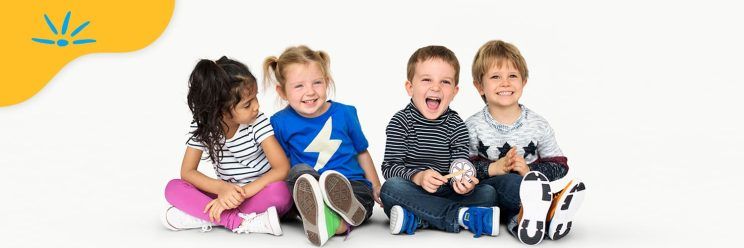Kindergarten Math Skills Checklist
Updated on January 9, 2024
As a child start learning math in the kindergarten math curriculum, they gain skills that are essential in their everyday lives. That is because much of the information they will learn will be used growing up.
A child who does not acquire such kindergarten math will experience obstacles down the line due to learning difficulties. So, this article focuses on the specific math skills you need to teach your kindergarteners before they start getting advanced education. It answers the common question: what math should a kindergartener know?
Math Skills for Kindergarteners
What math do kindergarteners learn? The answer is simple; children in this age group try to learn to count and recognize numbers and shapes, do simple subtractions and additions, etc. These constitute a child’s first approach to mastering mathematical skills needed to switch to elementary school programs.
Number Recognition And Counting
Numbers are the most critical section in the kindergarten math skills checklist. To succeed, a child should be able to read and count numbers first. Our first and earliest memory of math is learning to recite the numbers from 1 to 10.
Math is based on the whole foundation of numbers. You can’t start with anything else, but numbers, as the first component in numeracy skills for kindergarten, are about those. Numbers have the same value as the letters of the English alphabet. You cannot spell any word until you identify all the letters and understand their sounds when pronounced. Similarly, before progressing in math, one should be able to count from 1-10, 100, and so on.
The infiniteness of numbers means that once one gets to counting, they do not have to keep counting endlessly. Instead, kids only need to grasp some basic arithmetic that helps them go further with larger figures.
At first glance, counting seems simple, but children often leave out one or two numbers in the initial stages of writing. As children begin, they might require assistance memorizing numbers; therefore, basic math for kindergarten exercises and games have become valuable tools for learning.
Math & Reading Camp
Join us to help your kid achieve
their full math and reading potential!
 Apply now
Apply now
Patterns
Patterns in kindergarten math are integral for exploration. The students identify, develop, and extend patterns by engaging in these activities. It facilitates the development of analytical thinking, which will later serve as a basis for comprehending more complicated mathematical architecture. Games, puzzles, or hands-on activities become an exciting way of learning when pattern recognition is incorporated to render them entertaining and intellectually stimulating.
Sorting and Classifying
Again, what do kindergarten learn in math? Children learn about sorting and categorizing items according to several characteristics, such as their dimensions, color, or form. Such activities help kids develop categorization skills and form the foundation upon which further complex mathematical ideas will be built.
Sorting tasks can be developed using every day or thematic materials by teachers for young learners, making the learning process more relevant and “life-like.” Children improve their Math and develop their critical thinking when sorting and classifying. They understand how things are alike and different.
Graphing
When learning math in kindergarten, children are introduced to simple graphing, where they learn to construct and explain basic graphs. In this case, data is visualized in a simplified manner so that the child gains knowledge on how to analyze data.
Teachers can use attractive charts and graphs to represent the data collection. At the same time, the learners are active in class, leading to meaningful interaction with them through this method. From an early stage, students get used to graphing and begin representing and interpreting data.
Ordinal Numbers
First-order numbers like the first, second, and third are a critical component of what is kindergarten math. This causes children to learn to sequence events and objects, which is necessary for developing order, such as organizing themselves in lines or placing objects according to their sequence, a concrete experience reinforcing the mental order process.
Problem-Solving
Most of the math for kindergarten activities involve age-appropriate problem-solving tasks. These difficulties, at the same time, encourage pupils to apply kindergarten level math in life, solving problems through critical thinking. Kindergarten may involve problems like solving puzzles, figuring out patterns, and working together to share objects equally. These problems will lead the child to develop an analytical mind, likely to mature with age.
Addition And Subtraction Skills
When the child can understand the principles of counting and numbering, they learn advanced arithmetic, such as addition, subtraction, multiplication, and division. All of these skills require children to overcome different levels of difficulty. Consider evaluating the skills in addition and subtraction while using the kindergarten math skills assessment list to monitor a child’s math success.
Math skills kindergarten checklist introduces children to adding and subtracting small numbers, followed by math facts. Basic kindergarten math facts employ inter-mixable numerals, where the exact numbers are used repeatedly. You will always arrive at a number found in that family when you add, subtract, divide, or multiply any set of numbers within the family.
The 2, 3, and 5 families are clear types among them. Like for example 2+3=5, 3+2=5, 5-2=3 or 5-3=2. Following this phase, your kindergarten learner can add and subtract larger numbers.
Multiplication And Division Skills
Teaching multiplication and division in kindergarten seems stressful. But at its core, it’s just additions and subtractions with additional steps. All math skills for kindergarten students in this section are entwined. Therefore, it would be better to teach the topic of multiplication and division to give children an understanding of the relationship between these concepts.
Teaching multiplication and division will help kids cement their knowledge of addition and subtraction and build their confidence after each successful attempt.
Shapes And Form Recognition
With shape and form, what do kindergarteners learn in math? The world cannot do without shapes, so in early childhood, children study shapes. Try to imagine the first time you heard the word about the triangle. You probably had problems understanding the pronunciation, but you were impressed by the shapes.
Children are taught the various forms through graphic illustrations and creative stories. As an illustration, children could study these colors and imitate them using colored clay. The forms of objects they produce do not have to be perfect, but it is enough to understand that children get in touch with reality with their unsuccessful attempts at the wrong things. As they move up the class, they will also learn more advanced shapes, such as the hexagon, octagon, parallelogram, etc.
Math & Reading Camp
Join us to help your kid achieve
their full math and reading potential!
 Apply now
Apply now
Measuring Skills
Measurement and data are among the objectives that kindergarten teachers create when setting up their classes. The measurement part will be introduced to kindergarten learners slowly and with minimum complexity. The comparative ‘greater/less than’ principle (>/<) may confuse a kindergarten child initially, but measurements will clarify it.
One might consider the measuring skill level too much for kindergarten learners. However, it depends on how in-depth the measuring questions are. By the age of kindergarten, children should at least be able to say something when faced with differences in heights and sizes of people. At the same time, as they learn to work with sizes and lengths, they will also understand the principles of sorting, organization, and classification.
Conclusion
Finally, what do you learn in kindergarten math? Should a kindergartner know basic arithmetic equations or more complex math concepts? Everything discussed in this article are the core basic math skills for kindergarten that parents intending to home-school their children or help with homework should take note of.
For this reason, kindergarten kids need more attention in math skills. They need to be signed up at Brighterly. The tutors in this educational platform are sensitive and often develop exciting ways of enlightening your kindergarten kids.












